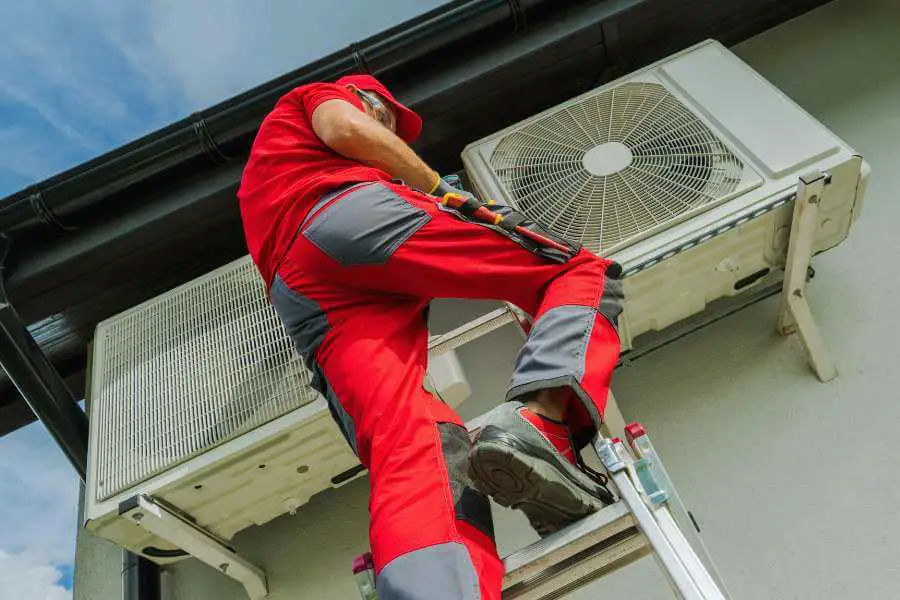Are you wondering how long it takes to replace a central air conditioner? If your AC unit is on its last legs, you’re probably already running the numbers.
But the reality can be a lot more complicated than you think.
In this article, we’ll explain the timeline for replacing a central air conditioner and other factors to consider.
We’ll also discuss the signs that you need to replace your AC unit and the potential costs you can expect.
So if you want to stay cool, read on to get the answers you need!
Table of Contents
How Long To Replace Central Air Conditioner?

Replacing a central air conditioner takes a lot of work.
Several factors determine how long it will take to install a new unit.
On average, it will take between four to eight hours, depending on the size of the home, the quality of the ductwork, and the dimensions of the AC unit.
The location of the AC unit is also a factor.
It will be much easier for a repair crew to access a townhouse or family home than a high-rise building, requiring more time.
Any repairs that need to be done will also affect the installation time.
If the repairs are simple, they will take less time and cost less money. In contrast, complex repairs that involve upgrading the ductwork will take longer and be more expensive.
In short, there is no one-size-fits-all answer to how long it will take to replace a central air conditioner.
The total time necessary for replacement is virtually impossible to calculate due to the many factors involved.
But if you work with a reputable AC installation company, they can provide you with an estimate of how long the process should take.
Signs Your Air Conditioner Needs to be Replaced
If you’ve had your air conditioner for over a decade, it may be time to consider replacing it.
Even with regular maintenance, air conditioners typically last between 10-15 years, so if yours is on the older side, it’s unsurprising if you’re having issues.
One sign that you might need a new A/C is if it’s experiencing frequent breakdowns.
Are you constantly dealing with a system that needs repairs? If so, it may be time to start looking for a replacement.
Another sign that you need to consider a new A/C is if your energy bills are consistently increasing.
This could be an indication that your A/C is losing efficiency or malfunctioning, so it’s not doing its job of keeping your energy costs down.
Finally, starting in 2020, R-22 Freon will no longer be available in the U.S., so if your A/C uses Freon, you should seriously consider getting a new one sooner rather than later.
If you’re noticing any of these signs, it’s probably time to invest in a new A/C.
While it can be a bit of a hassle to replace your system, a new A/C can make all the difference in your home’s comfort level and energy efficiency.
Plus, having an updated system that you know is in good condition can give you peace of mind and save you money on repairs.
Best Practices for Protecting Your AC

When it comes to protecting your air conditioner, there are some best practices you can follow.
First, it is essential to change your filter on a regular basis.
This will reduce the strain on the system and help you save energy.
It is also a good idea to have your HVAC system serviced at least once a year.
This will help keep it in good condition and will help honor any warranties you may have.
Additionally, neglecting the maintenance of your air conditioner can result in higher utility bills and more costly repairs down the road.
Keeping a regular maintenance schedule for your air conditioner is a great way to ensure that it is running optimally and efficiently.
Not only will this help you save money in the long run, but it will also help protect your unit from more serious problems.
Additionally, it is important to check for any warning signs of a problem before it escalates.
Signs such as strange noises, warm air coming from vents, or a sudden increase in your energy bill are all indicators that something is wrong and that you should contact a professional.
Finally, it is also important to ensure the area surrounding your air conditioner is well maintained.
This includes keeping the area clear of any debris, leaves, or other obstructions.
This will help keep the air flow unrestricted and will help your unit to operate at its best.
By following these simple best practices, you can protect your air conditioner and keep it running optimally for years to come.
So, don’t wait until it’s too late – take the time to maintain your HVAC system and keep your energy bills low.
Final Thoughts
Replacing your central air conditioner is an important decision that shouldn’t be taken lightly.
With some research and understanding of the process, you can be prepared and make sure that the job is done correctly and in a timely manner.
Take the time to consider all of your options, get multiple quotes, and make sure that you are comfortable with the contractor you choose.
Remember, replacing your central air conditioner is an investment in your home, and it pays to make sure that it’s done right.
